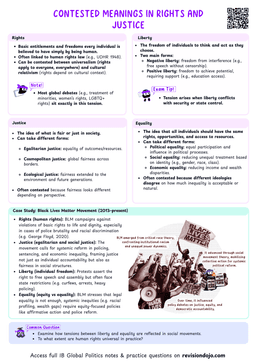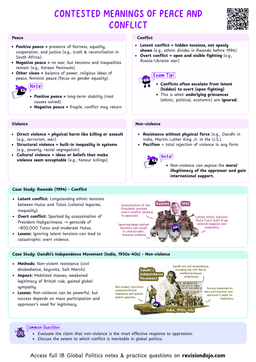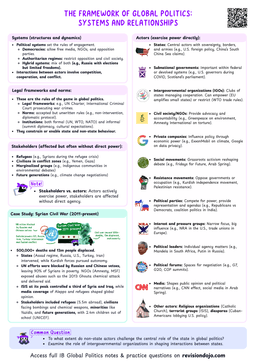Understanding Power in Global Politics
Power
Power is the ability to influence or control the behavior of others to achieve desired outcomes.
- Power is a central concept in global politics, shaping relationships between states, institutions, and individuals.
- Significance: It determines how decisions are made, who benefits, and who is marginalized in the international system.
- Power is not static, it evolves with changing political, economic, and technological landscapes.
Types of Power
1. Hard Power
Hard power
Hard power refers to the use of coercion or force to achieve political objectives.
- Military Power: The use or threat of force to influence other actors.
- Examples: Invasions, military alliances, arms sales.
- Economic Power: The use of economic incentives or sanctions to influence behavior.
- Examples: Trade embargoes, financial aid, investment.
- The United States' invasion of Iraq in 2003 is a classic example of hard power, where military force was used to achieve strategic objectives.
2. Soft Power
Soft power
Soft power is the ability to shape the preferences of others through attraction and persuasion, rather than coercion.
- Cultural Influence: Promoting values, norms, and lifestyles that others find appealing.
- Examples: Hollywood films, music, fashion.
- Diplomacy: Building alliances and partnerships through dialogue and negotiation.
- Examples: International treaties, cultural exchanges.
- The global reach of the BBC World Service, British universities like Oxford and Cambridge attracting international students, and the worldwide popularity of British cultural icons like Shakespeare, Harry Potter, and the Royal Family have all strengthened the UK's international image and influence without using military or economic pressure.
3. Smart Power
Smart power
Smart power is the strategic combination of hard and soft power to achieve foreign policy goals.
- Balanced Approach: Using military strength alongside diplomatic efforts and cultural engagement.
- Smart power is seen as a more flexible and realistic approach in today’s complex global environment, where influence often depends on both strength and attraction.
- In the fight against ISIS:
- Hard Power: The U.S. led military airstrikes against ISIS targets in Iraq and Syria.
- Soft Power: The U.S. worked with local communities, supported education initiatives, and used media campaigns to counter ISIS propaganda and win local support.
- When analyzing a country's foreign policy, look for how it balances hard and soft power to achieve its objectives.
4. Relational Power
Relational power
Relational power focuses on the dynamics between specific actors, emphasizing contextual and situational factors.
- Negotiation Power: The ability to influence outcomes in diplomatic or economic negotiations.
- Alliance Dynamics: How power shifts within alliances or coalitions based on mutual interests and dependencies.
- The European Union's influence in trade negotiations often depends on its ability to present a unified front, highlighting the importance of relational power.
Theoretical Perspectives on Power
1. Realism
- Focus: Hard power, particularly military and economic capabilities.
- Key Idea: Power is a zero-sum game, states compete for dominance in an anarchic international system.
- Realists often emphasize the importance of balancing power to prevent conflicts and maintain stability.
2. Liberalism
- Focus: Soft power, cooperation, and international institutions.
- Key Idea: Power can be positive-sum, with states benefiting from collaboration and interdependence.
- Liberals highlight the role of international organizations and norms in mitigating the anarchic nature of the international system.
3. Constructivism
- Focus: The social construction of power through ideas, identities, and norms.
- Key Idea: Power is not just material, it is shaped by shared beliefs and perceptions.
- The global norm against the use of chemical weapons illustrates how constructivism views power as rooted in shared values and identities.
Analyzing Power in Global Politics
- Multidimensional: Power operates across military, economic, cultural, and institutional domains.
- Contextual: The effectiveness of power depends on the specific context and relationships involved.
- Dynamic: Power is constantly evolving, influenced by technological advancements, shifting alliances, and changing global norms.
- Identify a recent international conflict or negotiation.
- Analyze the types of power used by the key actors and evaluate their effectiveness.
- How do our cultural perspectives shape our understanding of power?
- Consider how different societies prioritize hard, soft, or structural power in their foreign policies.


